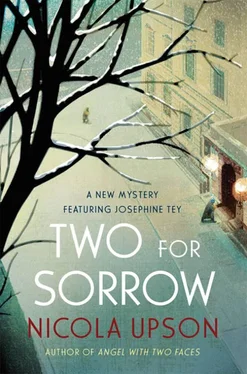‘All right, then …?’
‘Lucy, Miss.’
‘All right, Lucy—I won’t hold you up any longer. But be more careful next time.’
‘Yes, Miss—thank you.’
Josephine watched as Lucy hurried off towards the middle of Cavendish Square, then turned and went inside, glad to be out of the cold. The club’s entrance hall was spacious and uncluttered, the focal point being a long reception desk made of diligently polished mahogany. A modest bronze tablet hung to the right of the desk, set in an oak frame which contained the Cowdray coat of arms and recorded the gratitude of the first two thousand members to their founder; other than that, the walls were free of decoration, and the eye of any visitor was drawn instead to a number of beautifully furnished rooms which opened straight off the foyer. Miss Timpson was back at her post, and Josephine was treated to the full Cowdray Club welcome.
‘Ah, Miss Tey,’ she beamed from behind her desk. ‘You’ve had a successful afternoon, I see. Can I get you your key?’
‘That would be lovely,’ Josephine said, matching the sincerity of the receptionist’s smile and trying to think who the woman reminded her of. ‘And there are some more parcels on their way, I’m afraid.’
‘They’re already here—Robert has just taken the last of them up to your room.’ She cast a judgemental eye over the parcels, lingering on the scuff-marks where the boxes had hit the ground. ‘Would you like him to give you a hand with those? I’m afraid the lift’s out of order again.’
‘No, no—I’ll manage,’ Josephine said, knowing that she had—in Miss Timpson’s eyes at least—wasted quite enough of Robert’s time already that day. ‘They’re not heavy.’
‘If you’re sure.’ She reached up to take the key off its hook, and Josephine realised instantly that the resemblance she had been racking her brains to place was with the mannequin in the shop window: Miss Timpson shared that untouched-by-the-cares-of-the-world quality, an air of casual perfection which most women found insufferable, if only because they aspired to it themselves and always fell so short of the mark. ‘Just say if there’s anything else you require.’
‘You’ll be the first to know.’ She took her key and headed for the stairs, but hadn’t got far before a familiar voice called her back.
‘Josephine! Just the person I was looking for.’
She turned to greet Celia Bannerman and was struck—as always—by how little she had changed in twenty years. Her long dark hair, which Josephine had never seen worn any other way than scraped back from her face into a bun, was streaked with grey at the temples, and her glasses were needed too frequently now to be worn on a chain around her neck, but no one would have guessed that she was nearly sixty. They had first met during the war at Anstey, a Physical Training College in Birmingham where Josephine was a student and Miss Bannerman one of the senior teachers; by the time their paths crossed again at the Cowdray Club, Miss Bannerman—or Celia, as she had tried to get used to calling her—had become one of the most respected figures in nursing administration and was heavily involved in the management of the club. She had certainly come a long way since her earlier job as a warder at Holloway, but it was those years that interested Josephine now.
‘I was just going to leave a message for you at reception,’ Celia said, ‘but you’ve saved me the trouble. Your note said that you’ve got something for me to read?’
‘Yes, the first draft of what we discussed the other day. I wondered if you’d have a look at it, just to make sure it’s reasonably accurate—and I have a few more questions, if you’ve time.’
‘Yes, of course.’ She looked at her watch. ‘I’m free now for a while, if that suits you? Shall we say in fifteen minutes’ time, just to give you a chance to catch your breath? I’ll see you in the drawing room.’
She walked back into the lounge without waiting for an answer, and Josephine recognised the same confidence in her own authority that had earned Miss Bannerman the respect of all her students—respect tinged with just the right amount of fear. She had seen that authority falter only once, and then just briefly and under exceptional circumstances, and it never failed to bring out the schoolgirl in her. She headed for the stairs again like a straggler late for lessons, but was stopped once more in her tracks, this time by Miss Timpson. ‘Oh Miss Tey, I nearly forgot—don’t go upstairs without this,’ she called, and at the higher volume her East End vowels were satisfyingly evident. ‘It arrived for you earlier this afternoon.’ She bent down to pick something up from the floor behind the desk and presented Josephine with an expensive-looking ornamental gardenia. Josephine held out her hand for the card.
‘Sorry—that’s it. There’s no note.’
‘Are you sure it’s for me?’
‘Oh yes. The boy from the shop was very particular. I had to sign for it.’
‘But no one knows I’m here.’
‘Then perhaps you have an admirer on the inside, darling.’ There was no need to turn round to see where the suggestion came from: the voice—warm, attractive and full of innuendo—was an established feature of the Cowdray Club, as familiar to its members as the decor and just as expensive. The Honourable Geraldine Ashby fell into an unusual category of membership: neither nurse nor professional, she was one of a handful of women who were elected to the club at the discretion of the council and whose purpose was purely social. Geraldine’s mother was more than happy to secure the position each year with a generous cheque to the College of Nursing—after all, the association was the most respectable thing about her daughter—and Geraldine took her social responsibilities as seriously as the other members took their work. No one could deny that she livened things up considerably, and not just because she mixed the finest cocktails outside the Savoy: everything about her was daring, and that made a refreshing change from the cloud of earnestness that hung over so much of the club. It was impossible not to be drawn to her charm and good humour, and her beauty—a chic, adventurous beauty—sparkled as effortlessly in a tailored suit as it did in the latest Chanel. Forgetting for a moment the young girl on her arm—a pretty if rather dull-looking blonde—Geraldine smiled wickedly at Josephine. ‘Just think—it could be any one of us. Who would you like it to be from?’
Experience had taught Josephine that a suitable response—flirtatious, with just the right amount of disdain—would only come to her later that evening, so she didn’t bother to reply but picked up the flower with what she hoped was an enigmatic smile and strode determinedly up the stairs. She realised from the smirk on Miss Timpson’s face that her admirer had been a matter of speculation from the moment the flower crossed the threshold, and tried to work out who could have sent it. Archie? It seemed unlikely—gardenias weren’t his style; if he knew she was already in London, he would have chosen something far less showy and he would have brought them himself. It certainly couldn’t be the Motley sisters—she doubted that Ronnie had ever done an anonymous thing in her life, and a flower from Lettice was always accompanied by a dinner invitation. Lydia, perhaps—it was a luxury beyond the budget of a struggling actress, but her friend was notoriously bad with money and such an extravagance would be typical of her. Or perhaps Geraldine was right after all, and another member of the club had sent it. Just what she needed—awkwardness creeping into the only safe haven left to her. She shut her door with a sigh of relief, stuck the flower unceremoniously in the sink, and tried to forget about it.
Читать дальше












